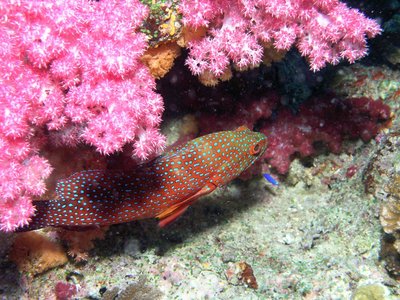Grouper
|
|
Groupers are fish of any of a number of genera in the subfamily Epiphelinae of the family Serranidae, in the order Perciformes. The word "grouper" comes from Portuguese "garoupa".
Not all serranids are called groupers; the family also includes the sea basses. The common name grouper is usually given to fish in one of two large genera: Epinephelus and Mycteroperca. In addition, the species classified in the small genera Anyperidon, Cromileptes, Dermatolepis, Gracila, Saloptia and Triso are also called groupers. Fish classified in the genus Plectropomus are referred to as coral groupers. These genera are all classified in the subfamily Epiphelinae. However, some of the hamlets (genus Alphestes), the hinds (genus Cephalopholis), the lyretails (genus Variola) and some other small genera (Gonioplectrus, Niphon, Paranthias) are also in this subfamily, and occasional species in other serranid genera have common names involving the word "grouper". Nonetheless, the word "groupers" on its own is usually taken as meaning the subfamily Epiphelanae.
Groupers are teleosts, typically having a stout body and a large mouth. They are not built for long-distance fast swimming. They can be quite large, and lengths over a meter and weights up to 100Kg are not uncommon, though obviously in such a large group species vary considerably. They swallow prey rather than biting pieces off it. They do not have many teeth on the edges of their jaws, but they have heavy crushing tooth plates inside the pharynx. They habitually eat fish and octopuses and crabs and lobsters. They lie in wait, rather than chasing in open water.
Many groupers are important food fish, and some of them are now farmed. Any species are popular fish for sea-angling. Some species are small enough to be kept in aquaria, though even the small species are inclined to grow rapidly.
The species Epinephelus lanceolatus can grow very large: there have been reports of them growing big enough to swallow a human bather or even a scuba diver: for example, while scuba diving in the an inlet on the coast of Sri Lanka Arthur C. Clarke saw a grouper about 20 feet long, and 4 feet thick side to side, living in a sunken floating dock. There was a report in a scuba diving magazine in the 1970's of an incident off the coast of California when a big grouper sucked a scuba diver completely into its mouth, tried to crush him between its pharyngeal teeth but luckily only dented his cylinder in, and spat him out. Swallowing an ordinary open-circuit scuba diver would need a throat that can expand to about 2 feet square. It could be that Epinephelus lanceolatus does not grow that big more often because it needs a big enough shelter to hide from attack by sharks, and that the situation may change if the current worldwide decimation of sharks for the shark fin trade continues. (There has been a recent report that killing sharks is causing more groupers, and thus fewer parrot fish, and thus more algae overgrowing the coral reefs.)
Species of grouper with more information available in Wikipedia include:
- Black grouper Mycteroperca bonaci
- Nassau grouper Epinephelus striatus

